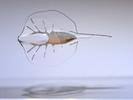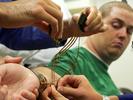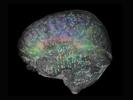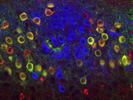Jon Hamilton appears in the following:
A Mouse Watches Film Noir And Offers Clues To Human Consciousness
Wednesday, July 13, 2016
Synthetic Stingray May Lead To A Better Artificial Heart
Thursday, July 07, 2016
A Protein That Moves From Muscle To Brain May Tie Exercise To Memory
Thursday, June 23, 2016
How A Team Of Elite Doctors Changed The Military's Stance On Brain Trauma
Friday, June 10, 2016
An Army Buddy's Call For Help Sends A Scientist On A Brain Injury Quest
Wednesday, June 08, 2016
A Concussion Can Lead To Sleep Problems That Last For Years
Wednesday, April 27, 2016
Half Your Brain Stands Guard When Sleeping In A New Place
Thursday, April 21, 2016
Technology Helps A Paralyzed Man Transform Thought Into Movement
Wednesday, April 13, 2016
Big Financial Costs Are Part Of Alzheimer's Toll On Families
Wednesday, March 30, 2016
Beam Me Up, Scotty? Turns Out Your Brain Is Ready For Teleportation
Thursday, February 25, 2016
Sorry, Bogie, A Sigh Is Not Just A Sigh
Monday, February 08, 2016
The sighs we notice usually accompany emotions like relief or discontent. But our brains are programmed to make us heave an unconscious sigh every five minutes or so — no matter how we feel.
"Sighing is vital to maintain lung function," says Jack Feldman, a brain scientist at UCLA. ...
Lack Of Deep Sleep May Set The Stage For Alzheimer's
Monday, January 04, 2016
A New Study Raises Old Questions About Antidepressants And Autism
Monday, December 14, 2015
Taking antidepressants during the second or third trimester of pregnancy may increase the risk of having a child with autism spectrum disorder, according to a study of Canadian mothers and children published Monday in JAMA Pediatrics.
But scientists not involved in the research say the results are hard to interpret ...
A Peek At Brain Connections May Reveal Attention Deficits
Monday, November 23, 2015
A Genetic Map Hints At What Makes A Brain Human
Monday, November 16, 2015
The Brain's GPS May Also Help Us Map Our Memories
Wednesday, November 04, 2015
30,000 Brain Researchers Meld Minds At Science's Hottest Hangout
Thursday, October 22, 2015
Weak Brain Connections May Link Premature Birth And Later Disorders
Monday, October 19, 2015
Can A Cancer Drug Reverse Parkinson's Disease And Dementia?
Saturday, October 17, 2015
A drug that's already approved for treating leukemia appears to dramatically reduce symptoms in people who have Parkinson's disease with dementia, or a related condition called Lewy body dementia.
A pilot study of 12 patients given small doses of nilotinib found that movement and mental function improved in all ...

















